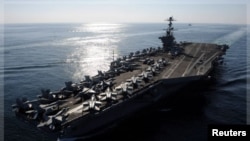The United States is not interested in a confrontation with Iran over the Strait of Hormuz, but is committed to ensuring safe and secure passage for ships using the strategic waterway.
The Strait is the only sea passage to the open ocean for the oil-producing Gulf countries, and, according to the U.S. Energy Information Administration, about 35 percent of all seaborne-traded oil and approximately 20 percent of all oil traded worldwide pass through it.
Iran recently threatened to close the Strait of Hormuz if additional international sanctions were to target its oil exports. And Iranian army chief Major General Ataollah Salehi warned the U.S. against redeploying an aircraft carrier to the region.
Pentagon Press Secretary George Little said in a statement that “the deployment of U.S. military assets in the Persian Gulf region will continue as it has for decades.” He added, “Our interest is in safe and secure maritime passage for ships transiting the Strait of Hormuz.”
State Department spokesperson Victoria Nuland said the United States takes seriously the role of its military, particularly its navy, in ensuring freedom of navigation through essential routes:
“We are not seeking a confrontation, but we will make sure that the role that we play in ensuring global freedom of navigation is continued.”
White House spokesman Jay Carney said that the belligerent rhetoric emanating from Iran is a sign that the regime is feeling the pressure from existing sanctions imposed by the international community for Iran’s failure to comply with its international nuclear obligations.
I think it reflects the fact that Iran is in a position of weakness. ... Iran is isolated and is seeking to divert attention from its behavior and domestic problems. This is simply a measure of the impact that sanctions have been having on Iran and the broad international support for ... putting pressure on Iran and isolating Iran because of its refusal to live up to its international obligations.”
Both Ms. Nuland and Mr. Carney noted that the recent drop in Iran’s currency seems to be one significant effect of the sanctions, which Ms. Nuland called “biting.” She emphasized that the sanctions are aimed at a clear purpose: “We want to see Iran come back into compliance with its international obligations, [and] to do so peacefully.”
Freedom Of Navigation And Peaceful Solutions

The U.S. committed to ensuring safe and secure passage for ships using the Strait of Hormuz.



